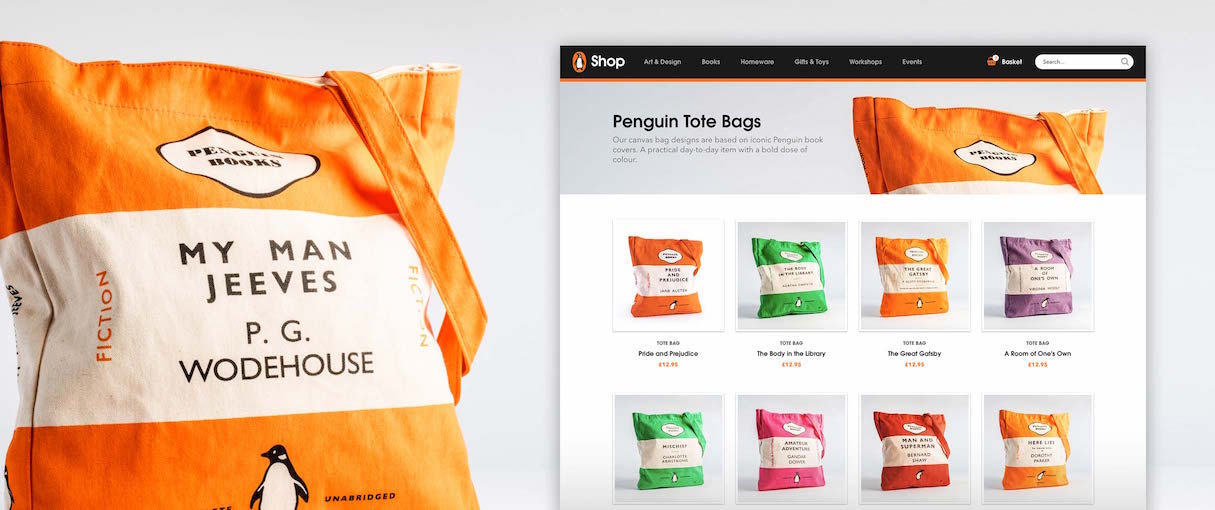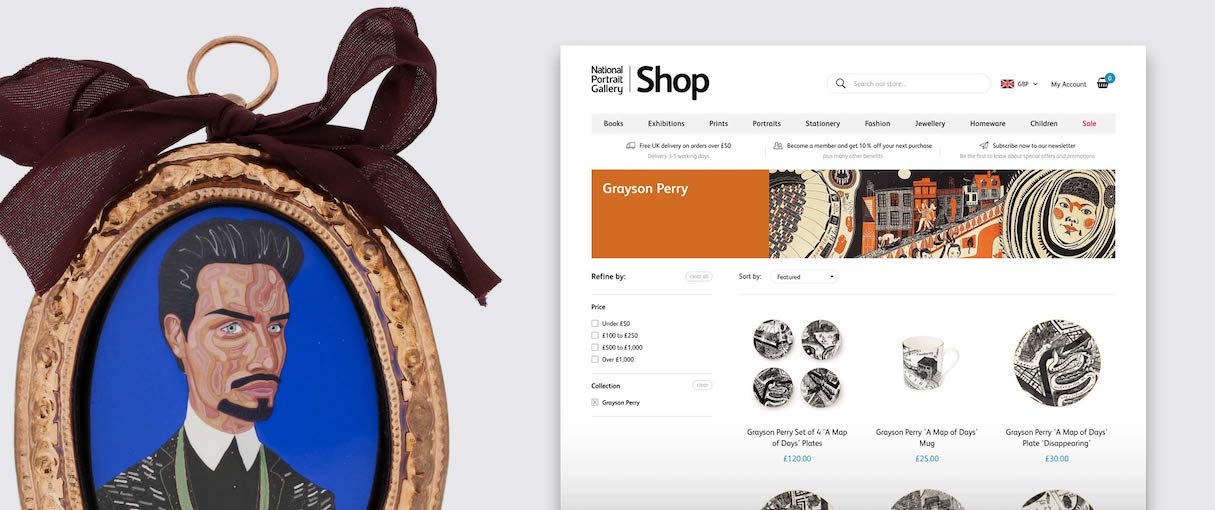After reading American novelist Hunter S. Thompson’s “The Rum Diary,” Alex O’Byrne’s life changed.
At the time, Alex worked for a swanky American bank located in London. He hated his job, and found himself working in a stuffy environment, amongst what he calls the “posh boys.”
“When I got to my mid-twenties, I just had that feeling like I'd rushed into the career maybe, and that I should've taken more chances and done more crazy things.”
But even the swank and stuffy have a purpose. That boring bank job is where Alex met his current business partner, Piers Thorogood.
Today, the duo make up one of Europe’s top web design and development firms, We Make Websites. With over 500 ecommerce projects completed, the Shopify Partner is ranked number one in Europe for Shopify providers, and has worked with every kind of high-end client, from high fashion lingerie merchants to prestigious media companies.

But back in the day, the pair started off as computer science interns. After a few years of working full time, the guys hatched a tentative plan to start their own business making websites. They hadn’t fully committed to launching anything—until Alex read Thompson’s booze-fueled and adventurous tale while on vacation in France.
“I came back from that trip, and that was it. I quit. It was not planned. I rang Piers when I walked out. I said, ‘I quit, so we're going to have to make this work.’ He was like, ‘Oh, f%$#@&*! hell’,” Alex recalls with a laugh.
From that moment of clarity, a business was born that’s since dominated the European ecommerce market. The end of 2016 marked seven years of business for the mega-successful company. In honor of that milestone, the pair have offered seven lessons they learned while in the trenches of growing a business.
A bit of backstory...
Based in London, We Make Websites brings the biggest and most hyped brands onto Shopify exclusively. This includes trendy lifestyle brands like Finisterre, Skinnydip, and Bluebella, as well as massive companies that sell direct to consumer, like The Economist Group and Whitbread, and heritage brands like Penguin Books.

Along with their team of 15, Piers and Alex spend the majority of their time replatforming and building stores for growth-stage brands. Many of these were previously using clunky enterprise solutions.
“Our communication, reliability, and professionalism are big selling points. Brands also work with us because of our design pedigree,” Alex explains. “Our design team does an excellent job of meeting commercial goals, whilst staying true to the brand. We have our strongest team ever and I couldn’t be prouder.”

The company has a reputation for building lingerie stores, a surprisingly tricky ecommerce feat to get right due to the balance between elegance and commerce required. Alex, who’s proud yet humble about his company’s achievements with mega cultural brands like the National Portrait Gallery, adds that he never expected his path to lead to knickers.

“I made my first website when I was 11, just a really simple thing. I remember looking online then, and it was kind of a nerdy place that was interesting if you were into programming or science, but it wasn't like now,” Alex muses.
“Now it’s the place where culture happens, it’s the arena for politics to play out, it’s where millions follow mega-celebrities, it’s where the majority of our time and attention goes. It’s where life happens, I suppose. Thinking back to those earlier years, to say that I would have expertise in online lingerie retail is absolutely mental.”
7 lessons for 7 years
Midway through a massive rebrand for their company website, Alex and Piers have entered a period of reflection on their seven years of experience. In that time, they’ve worked on 300 Shopify-specific websites, seen their revenue triple year-over-year, and watched their team grow to 15 employees.

Below, Alex outlines the seven top pieces of advice the team has after seven years of successes, challenges, and yes, even a few failures.
1. Find a niche
For We Make Websites, it was obvious in 2012 that ecommerce clients valued their services more than regular clients, who had big expenses like lawyers, but who saw a website build as a necessary cost with very little value.
“The ecommerce brands know that if they put money into conversion optimization, a new design, or a new platform, they're going to see the return directly and they can measure it.”
Focusing on a niche helps you:
- Stand out from the market when you’re a small business
- Simplify operations, hiring, and sales
- Be a specialist instead of trying to be good at everything
Find the overlap between what you’re good at (or what you could be good at), and what people value.
Find the overlap between what you’re good at (or what you could be good at), and what people value. Your niche should be so strong that it puts most people off, Alex explains. But the people who are interested in what you do will know they’ve found the right person.
With time, We Make Websites eventually niched down even further to only build Shopify websites.
“Anyone wanting to use another platform immediately knows we’re not for them,” Alex says. “But those considering Shopify are way more likely to make an enquiry than if we just marketed ourselves as generic web designers.”
You might also like: Why You Should Specialize in Ecommerce.
2. Focus on growth
Agency founders need to focus on growth. What this means is:
- Focusing on marketing and hiring
- Trying to stay off the tools
- Passing on your expertise and nurturing a team
- Planning for growth
“You need to be working on the business, rather than in it,” Alex explains.
You need to be working on the business, rather than in it.
Don’t spend all your time on daily operations. Sure, you can deliver great work, but if you’re not looking at the big picture, you’re not progressing or improving your company. While part of Alex’s job includes the usual non-stop emails, daily operations, and dealing issues as they arise, high-level management and organization also take regular priority. That includes things like hiring and motivating teams, and ensuring they have the context and motivation to do their jobs.
“Your business can't be you,” he says. “There are so many small businesses that struggle because the business is the person, and that's not what we want to be. We want to build something that stands on its own.”
Focus always comes back to how you spend your time. Cut out stuff that doesn’t matter, like unnecessary meetings and trivial tasks. Alex says to think about where you want to be in three years, and using your goals as a filter for prioritizing daily tasks.
Grow Volume 3: Building a Profitable Web Design Business
Get your free copy of Grow Volume 3: Building a Profitable Web Design Business sent to your inbox.
By entering your email - we’ll also send you marketing emails related to Shopify. You can unsubscribe anytime. Note: the guide won't be delivered to role-based emails, like info@, developer@, etc.
3. Build an audience
Building an audience relies first on figuring out where they are, Alex explains. While some business owners are happy to rely on word of mouth, the team at We Make Websites wasn’t willing to wait around for growth, and didn’t have the backing or cash to invest in a huge marketing campaign.
So instead, they chose to do inbound marketing, creating interesting content for your audience so they read it by choice.
In order to define your target audience, ask yourself:
- Which companies do we want to work with?
- Who on their team would research and provision a new ecommerce website?
- What are their needs?
- What are they worried about at work?
- What do they Google search?
- Can we provide them with the answers they need?
Today, the We Make Websites’ blog regularly attracts 50,000 merchants a month with relevant and educational content on ecommerce. Additionally, Alex has created a downloadable guide entitled, “100 Ecommerce Tips” that sits on their website’s landing page.

“It doesn't just say, ‘Get our newsletter’ or ‘Did you like this?’ It's more like, ‘Do you want to learn 100 tips for your ecommerce site?’ That way, we know the email addresses are highly relevant because only someone that's an ecommerce manager or founder is going to download an ecommerce checklist.”
You might also like: 3 Simple Ways Your Agency Can Use Content Marketing to Build a Better Brand and Find New Clients.
4. Build your dream team
Hiring the right people and getting the best out of them should be the core competency of any business, Alex explains.
 When hiring, Alex’s checklist includes:
When hiring, Alex’s checklist includes:
- Make sure you’re testing for skills during interviews (for example, ask a designer to design something)
- Use the interview as an opportunity to sell the benefit of working at the company (remember that interviews are a two-way street)
- Take your time to hire, and don’t rush decisions
- Hire for attitude over skill
- Be willing to pay for the skill level you need to push the business forward (a tricky balance, Alex admits)
Don’t forget that organizing and nurturing your dream team is just as important as finding and hiring them. Alex reminds bosses to reward good people, to invest in training, and pony-up for fun activities that bring the team together.
It’s important that the vibe in your office is healthy. Make sure it’s a comfortable and inspiring place to be, where all team members get the content and information they need to make good decisions.
“Get everyone on the team together at least once a week, and make sure you take the time to reflect on successes, or use the ‘five whys’ method to analyze failures.” (In case you’re unfamiliar, that method includes taking a concept or decision and asking, “why?” a number of times, in order to get to the true root of the issue.)
Ensure you’re around for guidance, but empower your team to take ownership, and delegate as much as possible. Don’t be afraid to engage in informal reviews by using survey tools like Officevibe.
You might also like: What Brings All the Devs to the Yard? How to Find the Best Technical Talent for Your Agency.
5. Focus on process
Putting in place a solid process that fits your organization well is connected to lesson number two (focus on growth).
“Process means that you’re designing automated systems for the growth of the company, rather than doing it all yourself,” Alex explains.
Process is absolutely crucial to a successful business because without it, it takes ten times longer to get work done, and you make ten times as many mistakes. If you make sure every lesson you learn and improvement you make is baked into a process, it will help shorten your workflow and avoid repeating past mistakes.
“For example, we know that it's always important to have the client sign-off on the homepage design, before beginning to build,” he says. “That was a painful lesson we had to learn. But once it goes in the process, you never make the mistake again.”
After every project, Alex suggests performing a review where the team looks for areas of improvement. But this type of activity is pointless if it’s just a discussion.
The outcome of this meeting should be:
- Making a change to the existing process to ensure mistakes are not repeated
- Adding new processes to ensure future service is improved
This is your business’s way of creating and meeting standards, so create process as soon as you can — and stick to it.
You might also like: 6 Tips for Building a Web Design Process That Boosts Your Team’s Efficiency.
6. Implement your values
You started your business because you believe in something. Obviously, you want to make money, and the thought of running something that’s yours is appealing, but there’s got to be more than just that. It can’t be just about making money.
“Nobody starts a business with a blind mind, and succeeds,” Alex says. “You've got to actually love the work that you do.”
Nobody starts a business with a blind mind, and succeeds. You've got to actually love the work that you do.
That’s where your business values enter. They are the raison d’etre for your business; the purpose for its being; the reason you get up in the morning. How your business runs, the kinds of clients you take on, and the work you accomplish are all defined by your values. But how do you define those values?
According to Alex, it comes down to a bit of good ol’ navel gazing. Ask yourself:
- What are we actually trying to accomplish here?
- We do [enter business skills here], but what do we do for people?
“Our answer is that we’re helping them succeed in their ecommerce business,” Alex explains. “We love the technical side of doing design and building it, but also seeing the impact that it has on our clients.”
 That’s how the core value of “help clients win” emerged for We Make Websites. Defining a core value and implementing it with your team are two very different endeavors, however. Standing in front of your team, backlit by a Powerpoint presentation with your values written down, is not a strategy that sticks.
That’s how the core value of “help clients win” emerged for We Make Websites. Defining a core value and implementing it with your team are two very different endeavors, however. Standing in front of your team, backlit by a Powerpoint presentation with your values written down, is not a strategy that sticks.
“You've got to think, ‘How do I make this something that everybody believes?’ The answer is process.”
Create a process that communicates your core values. For We Make Websites, it meant creating processes that centred on helping clients win. This included ensuring designers and project managers meet with clients as early as possible, in order to understand the raw goals of each client from early on. They also created a staff program where every new hire tries running their own ecommerce store, in an effort to create merchant sympathy and an understanding of what it means to win as a merchant.
You might also like: The Counter-Intuitive Approach to Getting Your First Client.
7. Look after yourself
This piece of advice holds particular weight for Alex, a self-proclaimed recovering workaholic.
Growing a business is hard. Draining, even.
“Growing a business is hard. Draining, even,” he says. “Not everything can be fixed by a relentless focus on progress. I’m sick of the everything-is-awesome spirit of entrepreneurship. Life isn’t like that. Business isn’t even like that.”
Often, the entrepreneurial world can seem full of sunny personalities and a “keep trying” attitude. But the reality, as Alex explains, is that lots of things go wrong, lots of days are just difficult, and some are just boring.
“And of course, lots of days are good,” he adds. “I think it could be very alienating to people to think, ‘Is there something wrong with me because I'm unhappy, or because I'm not doing well at the moment?’ Sometimes you’re down, or sometimes you do need a break.”
His advice? Don’t work yourself into the ground. Value time for fun, holidays, and relationships. Nobody dies thinking they should have spent more time in the office. Take care of yourself, eat well, exercise, and practice gratitude.
It’s easy to forget all of this when you’re busy, but burning the candle at both ends only works for so long.

“I’m repeating this advice not because I’m good at it, but because I’m trying to do it myself,” Alex admits. “I had my own difficulties in the middle of building this business, and a lot of it could have been avoided by just taking it easy on myself, and taking more time off. I know it's hard to avoid, especially when you're growing, bootstrapping, and trying to get to the next level, but it’s worthwhile to take care of yourself.”
You might also like: 8 Agency Founders Share Their Top Tips on Achieving (Some) Work-Life Balance.
Unafraid to be genuine
For the team at We Make Websites, success truly came from learning how to be themselves in a professional, yet candid way.
“This didn't come immediately. We had to learn what was important,” Alex says. “We came from a corporate IT background therefore we put a lot of emphasis on quality, communication, and perception.”
He adds that getting projects right the first time with clients, and providing quality work with every single project, was another key to success, one they possibly took for granted in the beginning.
“It turns out that in our industry that in itself is a unique selling point.”
In the end, Alex says it comes down to prioritizing the right things at the right time. A mix of timing and process, if you will. Day-to-day tasks will never cease to exist, but keeping a list of your top five medium-term priorities will ensure you’re consistently striving to meet the growth goals you’ve set for yourself.
“Perhaps that’s improving the quality of a process, or thinking about what it’s like to be a client. Whatever the case, you’re going to learn new skills and make changes. Luckily, the hardest thing to change is attitude, so if you start with the right attitude, you’re already on your way.”
Grow your business with the Shopify Partner Program
Whether you offer marketing, customization, or web design and development services, the Shopify Partner Program will set you up for success. Join for free and access revenue share opportunities, tools to grow your business, and a passionate commerce community.
Sign up

